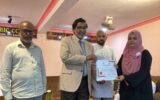A Crisis of Sovereignty and Sustainability
MASIHUDEEN INAMULLAH
COLOMBO : Sri Lanka is enduring the gravest economic crisis in its post-independence history. With a sovereign debt burden nearing USD 65 billion and annual debt servicing requirements exceeding USD 5 billion, the country defaulted on its repayments and turned to the International Monetary Fund (IMF) for assistance. While this has helped stabilize macroeconomic indicators, the social and political cost has been severe: increased taxation, reduced public welfare, and widespread hardship for ordinary citizens.
Although the IMF program is designed for long-term structural reform, its short-term impact has exacerbated poverty, inequality, and public frustration. In this context, it is both urgent and prudent for Sri Lanka to diversify its sources of economic support—away from a narrow reliance on IMF-led prescriptions and toward countries with longstanding partnerships and aligned development interests.
One of the most promising and underutilized frontiers lies to the west: the Arab Gulf.
Remittances: A Proven Lifeline
Nearly one million Sri Lankans currently live and work across Gulf Cooperation Council (GCC) countries, including Saudi Arabia, the United Arab Emirates, Qatar, and Kuwait. Their remittances—exceeding USD 5 billion annually—have long served as a critical pillar of Sri Lanka’s foreign exchange earnings, on par with exports and tourism.
These workers are not just economic contributors; they are cultural bridges and de facto ambassadors who reinforce decades of goodwill between Sri Lanka and the Arab Muslim world. Yet, despite this natural bond, Sri Lanka has not fully capitalized on the potential of its Gulf relationships as a strategic channel for recovery, development, and investment.
The Gulf’s Global Rise—and Sri Lanka’s Missed Opportunity
In recent years, the Arab Gulf states have emerged as major global investors. Sovereign wealth funds such as the Saudi Public Investment Fund (PIF), Qatar Investment Authority (QIA), and the Abu Dhabi Investment Authority (ADIA) are reshaping economies from Africa to Southeast Asia through investments in infrastructure, clean energy, logistics, and technology.
The United States and major European powers have deepened their ties with the region, securing hundreds of billions of dollars in investment and energy cooperation deals. Meanwhile, Sri Lanka—a traditional friend of the Arab world, and one of the few Asian nations that has consistently supported the Palestinian cause—has largely remained on the sidelines.
It is time to change that.
A Strategic Proposal for Re-Engagement
Sri Lanka should urgently recalibrate its foreign policy and economic diplomacy toward a structured, high-level engagement with the Arab Gulf. This includes activating both bilateral and multilateral channels with GCC states, the Arab League, and the Organization of Islamic Cooperation (OIC). A successful strategy would center around five actionable pillars:
1. Strategic Investment Partnerships:
Proactively court Gulf investors through targeted campaigns in sectors such as ports, energy, logistics, and agriculture. Present bankable, de-risked projects ready for FDI and joint ventures.
2. Enhanced Labor Agreements:
Negotiate new labor pacts to improve working conditions, facilitate skills upgrading, and streamline remittance flows. Ensure the long-term welfare of Sri Lankan workers in the Gulf.
3. Access to Development Finance and Grants:
Tap into Gulf-based development funds and sovereign wealth-backed grants for medium- to long-term infrastructure and human capital development.
4. Revitalized Diplomatic Missions:
Reorient Sri Lankan embassies in the region from consular-centric offices into dynamic hubs for trade, tourism, and economic diplomacy.
5. Leveraging Non-Aligned Diplomacy:
Use Sri Lanka’s historic role in the Non-Aligned Movement (NAM) to build trust-based relationships with Arab states that prioritize mutual sovereignty and development over ideological alignment.
Implementation Roadmap
A phased approach is essential for effective implementation:
Short-Term (0–6 months):
Identify strategic partner countries (e.g., Saudi Arabia, UAE, Qatar); initiate high-level government visits and sign memoranda of understanding.
Medium-Term (6–18 months):
Organize investment forums, bilateral business councils, and diaspora engagement platforms to activate proposed initiatives.
Long-Term (18–36 months):
Institutionalize partnerships through annual summits, economic commissions, and multi-sector cooperation agreements.
Conclusion: Toward a Sovereign and Diversified Recovery
Strategic re-engagement with the Arab Gulf is not a diplomatic luxury—it is a national necessity. The region offers a viable, stable, and friendly alternative to the limited options currently dominating Sri Lanka’s economic playbook. With deep-rooted cultural ties, a valuable diaspora, and a history of mutual support, the Arab world is uniquely positioned to serve as a lifeline for Sri Lanka’s recovery.
By pivoting toward a diversified foreign policy anchored in pragmatic cooperation, Sri Lanka can reassert its sovereignty, restore public confidence, and lay the foundation for inclusive, people-centered development. The hour calls not for hesitation, but for vision and leadership.
About the Author:
Masihudeen Inamullah is a Non-career diplomat and foreign policy analyst. He previously served as Sri Lanka’s Consul General in Jeddah, and as a consular officer at Embassies of Kuwait and the UAE in Colombo, He also held the position of Political Analyst at the Embassies of Saudi Arabia and Qatar in Colombo.
















